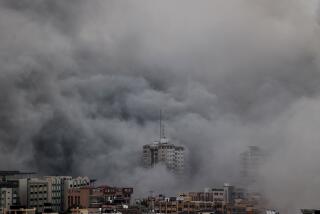Shamir and the PLO: Closer to Contacts?
- Share via
EL BIREH, Israeli-Occupied West Bank — In light of the disclosure that Prime Minister Yitzhak Shamir has met with Palestinian activists, Shamir’s insistence that this in no way constitutes contact with the Palestine Liberation Organization is wearing thin, Israelis and Palestinians alike say.
Senior Israeli officials say Shamir’s goal remains the same: to arrange elections for a peace delegation from the occupied West Bank and Gaza Strip, a delegation from which the PLO would be excluded.
Nonetheless, they note, Shamir has been forced to seek out leaders who are recognized by various segments of Palestinian society--and this means Arabs who are closely tied to the PLO, if not actual members.
“There is no doubt that the prime minister is looking for stronger counterparts among Palestinian leaders,” one Foreign Ministry official said, “so he has had to approach closer to contacts with the PLO.”
Another ministry official conceded: “We may soon find ourselves in the embarrassing position of having an official policy of not talking to the PLO (abroad) but meeting with them here. But if you expect Shamir to stand up and say so, you will be disappointed.”
Shamir opposed talks with the PLO because of its long association with terrorist tactics and its demand for a Palestinian state. Now, Israeli and Palestinian observers contend, he has taken steps--perhaps inadvertently--that run counter to that position. As a result, the election scheme that was designed to exclude the PLO may now draw it in.
The independent newspaper Yediot Aharonot, Israel’s largest-circulation daily, commented: “The prime minister closed his eyes and swallowed the bitter pill of meeting with Palestinians who identify with the PLO. Thus he mocked . . . a central condition he himself placed on his initiative--’no’ to dialogue with the PLO.”
‘It Is Meaningful’
“For anyone else,” a Palestinian activist said, “the contacts would not amount to much. But since it is Shamir, it is meaningful.”
A drift toward direct contact with the PLO is far from a sure thing, however. Already, Shamir’s talks with local Palestinians have drawn fire from members of his right-wing Likud party who fear that such contacts will impel Israel toward giving up all or part of the occupied territories.
At a Cabinet meeting Wednesday, Likud politicians warned that a “new and serious situation” has resulted from the talks with Palestinians linked to the PLO.
In response, Shamir held firm to his rejection of PLO contacts. “The people who come to me, not one of them told me he was authorized by the PLO to come,” he said on television. “If they had said a word about the PLO I would have told them, ‘Stop. Don’t talk to me about the PLO because I won’t talk to them.’ ”
Palestinian nationalists are not convinced that Shamir will go further and meet with people who are clearly PLO operatives.
The implications of the talks undertaken to this point are many, Arab and Israeli observers say: They relieve criticism on other Israeli officials who have talked with PLO officials or who might want to do so; they are a step toward conditioning the Israeli public to accept talks with the PLO, and they weaken the government’s pressure on foreign governments, notably the United States, to end their contacts with the PLO.
Shamir’s shift became evident this week with the disclosure here and abroad of the names of several Palestinians who have met with Shamir. One of them, Jamil Tarifi, a West Bank lawyer and businessman, reported publicly on his meeting, which he said took place in the past week. The disclosure created a stir in Israel and the occupied territories.
Tarifi, 42, has a long history of cooperation with Fatah, the PLO faction headed by Chairman Yasser Arafat. At a news conference, Tarifi described himself as “a PLO supporter, of course.”
In 1976, he was elected deputy mayor of El Bireh, a town 10 miles north of Jerusalem, running with the authorization of the PLO. He maintained contact with the PLO through frequent visits to Egypt, where he has business connections.
Tarifi is on good terms with Israeli military authorities in the West Bank. Among the family business interests are an asphalt company and a quarry. He has sold asphalt to the Israelis, and to mine marble he must receive special permission from the army to handle explosives. Thus, he is a known quantity, an unthreatening contact for the Israeli government.
According to Tarifi’s account of his meeting with Shamir, the prime minister repeated his offer of self-rule after elections and encouraged Tarifi to think it over.
Tarifi said he repeated oft-stated PLO conditions for agreeing to elections, among them the withdrawal of the Israeli army from cities and the eventual ceding of independence to Palestinians.
Tarifi added that he asked Shamir to enter into talks with the PLO. “We think we have the right to choose our representative, and we chose the PLO as our sole representative,” he said.
Tarifi avoided the question of whether he had informed the PLO before or after his meeting with Shamir. Asked specifically about this, he replied, “Nothing happens here without the PLO’s knowledge.” The issue of informing the PLO is explosive on both sides of the Israeli-Palestinian divide.
Shamir’s office is sensitive about the situation. A spokesman, Avi Pazner, was asked which Palestinians Shamir has been talking with, and he refused to give any names, saying that the Arabs would be placed in mortal danger.
More to Read
Sign up for Essential California
The most important California stories and recommendations in your inbox every morning.
You may occasionally receive promotional content from the Los Angeles Times.












